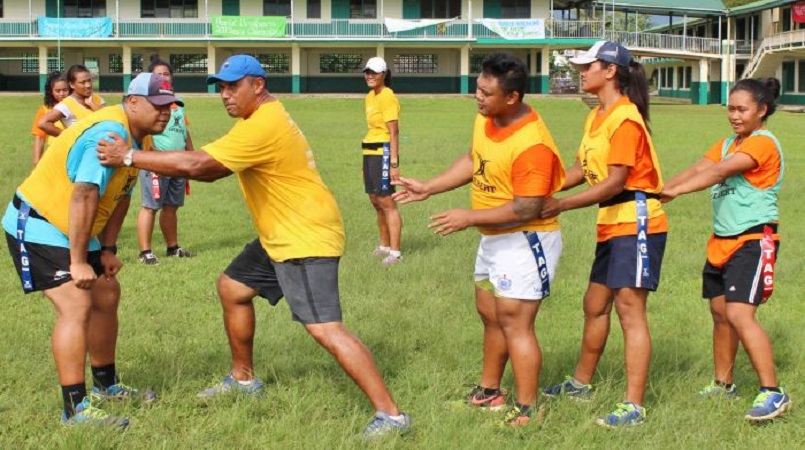
Women's rugby in Samoa has been in decline. But the drive of rugby-loving women, a devoted development team and a shift in cultural attitudes have combined to give the game new drive and hope.
Samoa loves rugby union.
The young man selling sarongs from a rickety card table in the centre of Apia proudly wears the national jersey, as do several shoppers.
In the villages, families huddle around TV screens to watch the Sevens World Series and taxi drivers proudly point out the homes of famous players.
But as they drive past Marist Brothers Primary School Mulivai, they barely notice what might be the nation's most devoted rugby players.
Many of the 25 women running around in the blazing sun and searing humidity have travelled more than one-and-a-half hours from the far side of the island for this chance to play.
Among them is Pogia. At 24, and just five months after having a baby, she is here in cut-off jeans and bare feet, showcasing her considerable talent to the rugby union hierarchy.
"Sometimes people look down on the women," she says.
"I don't know why because all the girls want to play."
Everyone freely admits that women's rugby was far healthier here a decade ago. No regular, serious competition exists and strong relationships within the education system have faded. But gatherings like this, backed by Australian Aid, are part of a renaissance. Schools are once again being engaged, festivals are being staged and a new push into rural and remote areas is underway.
"I want as many girls as possible shown the pathway to a career," says Samoan Rugby Development officer Shalom Senara.
"I'm really proud of these girls. It's not that easy. One, for the parents to let them come here and two, for the girls to get here."
Logistical and financial barriers plague the development of the game, but cultural hurdles have proven the toughest to tackle. The emergence of women's sevens at the Olympics, however, is being credited with a softening of traditional parental resistance to their girls playing rugby.
"Whatever your parent says, that's what you do," explains Samoa Women's Development officer Avi'i Fa'alupega.
"Some of the parents, they now understand.
"Earn the trust of your parents and the parents will allow you to do sports."
Tafale Roma Malesi has managed to play her entire life, including playing halfback for the Samoan national team.
"Samoan parents are strict, especially to the ladies," she says.
"Because rugby is in the Olympics that really helped. I think they understand now."
Out on the field, boggy from a week of heavy rain, the humidity is stifling. Shalom is playing referee and is contriving a thrilling finish to the match with some deliberately dubious decisions. The two teams take turns roaring in protest and then laughter.
Girls as young as ten are playing tag rugby with internationals, creating a strange mix of mentoring and manic competitiveness. Tag rugby is being increasingly offered in communities when full-contact sports are frowned upon for women.
As she surveys her Samoan sisters in action, Avi'i finds the magnitude of her task both daunting and inspiring.
"They want more. They want a competition.
"We can see the potential and we can see they really love it.
"The highest standard they can get to is the Olympics.
"These girls deserve a chance to go there and if we don't start now, we won't see it."
This group of women and girls, with their cut-off jeans and big dreams, may still be invisible to some in Samoa, but for others, they are a vision of what could be a thrilling new era for rugby and some of its greatest devotees.
